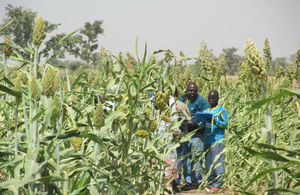Cameroon: Fair-trade future produce for vulnerable regions
An innovative joint project by the British High Commission and Diageo to boost sorghum production in the northern regions.

Sorghum plantation
The project “Fair-trade Future Produce for Vulnerable Regions” supports smallholder farmers in the conflict affected northern regions of Cameroon to get economic empowerment through improved sorghum yields, better management skills and use of a fair-trade compliant supply chain to take advantage of trade opportunities with food beverage companies.
The £55,000 project supports the partnership between Guinness Cameroun S.A. and Cameroon government’s Investment Project for the Development of Agricultural Markets (PIDMA) to:
-
improve the skills of fifty lead farmers so they are able to train other farmers, increase sorghum yields and implement farming of drought resistant sorghum and
-
ensure farming in the regions is based on principles of fair-trade agriculture which includes fair pricing, no child labour, gender equality and opportunities for economically disadvantaged people
Background
Agriculture constitutes the main economic activities in the Far North and North regions of Cameroon. However, these have been weakened by many factors amongst which security threats, climate change, poor farming techniques, planting low yield species, poor quality control, lack of preservation and transformation equipment and disconnection from the agribusiness chain which limits the quantity and quality of yields. All these contribute in not only making the food security situation worse but also in making farmers miss the significant business opportunities offered by food beverage industries like Guinness Cameroun S.A to increase their use of local produce (sorghum, cassava and maize) for the brewing of their products.
The Fair-trade training will ensure farming in the regions is based on principles of fair-trade agriculture which includes fair pricing, no child labour, gender equality and opportunities for economically disadvantaged people by training local cooperatives on the implementation of fair-trade policies. It will also ensure a right based approach as well as motivate farmers to use Fair-trade principles in the sorghum process. Our long term goal is to get the cooperatives certified as Fair-trade.
The project was managed on behalf of the British High Commission Yaounde by the Organisation for Gender, Civic Engagement and Youth Development (OGCEYOD) Cameroon; a non-governmental organisation in Cameroon working with youth and women in the following areas; education, employment, environment, HIV/AIDS and agriculture.